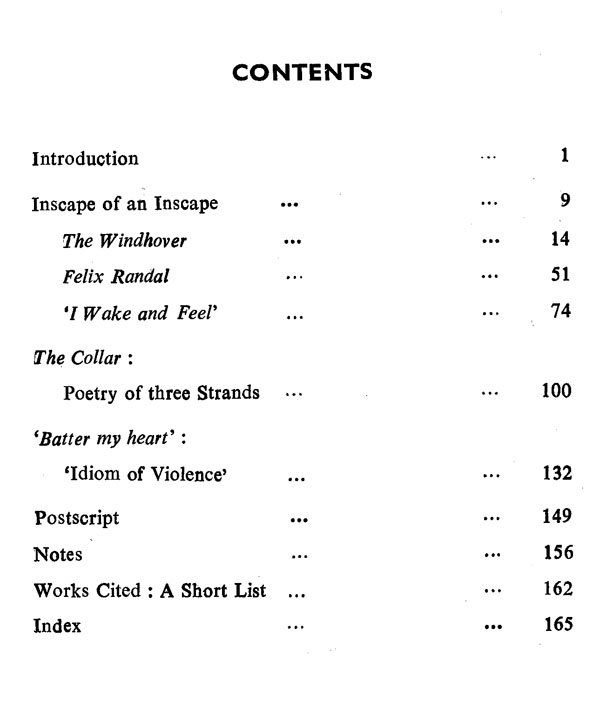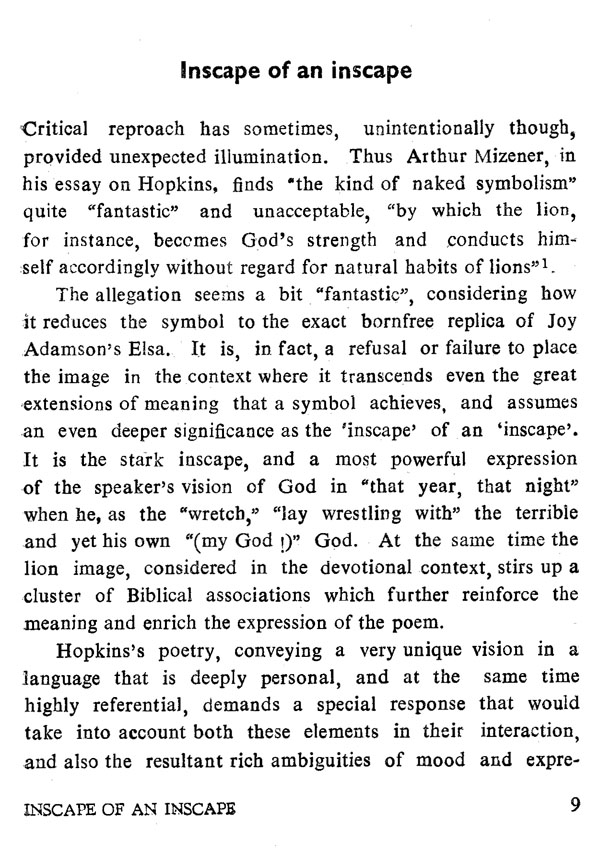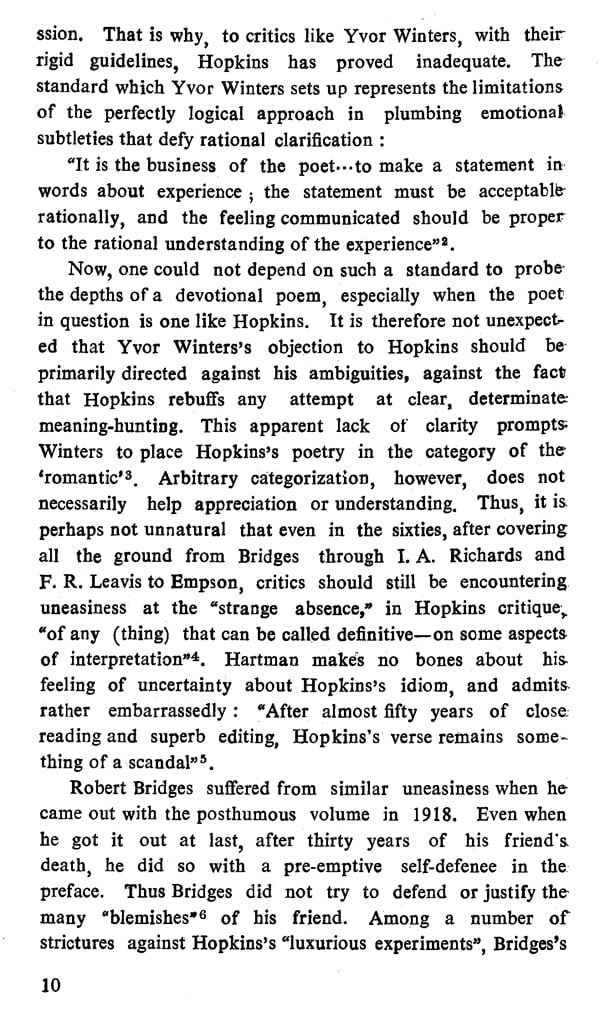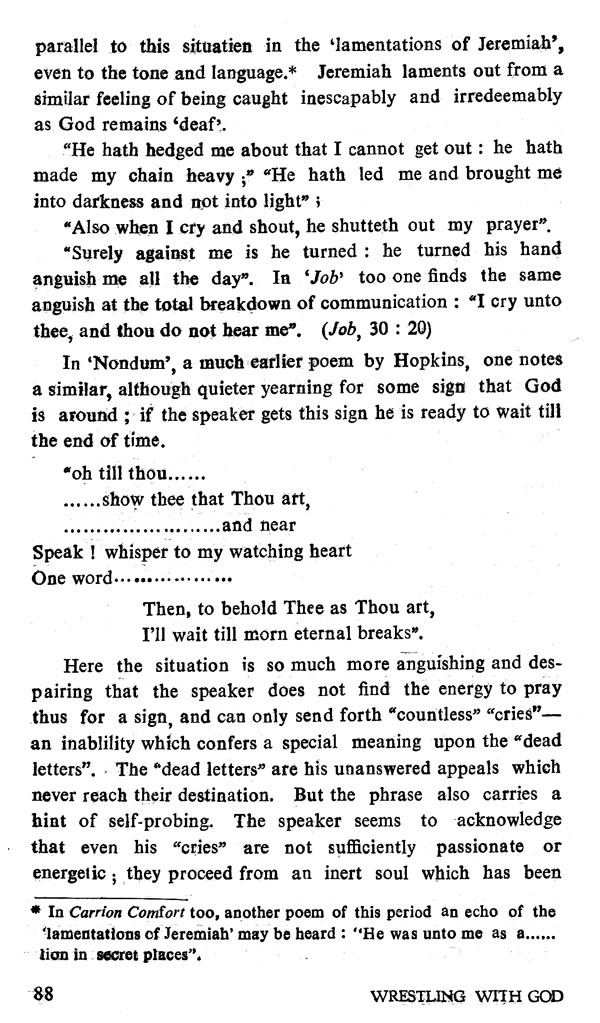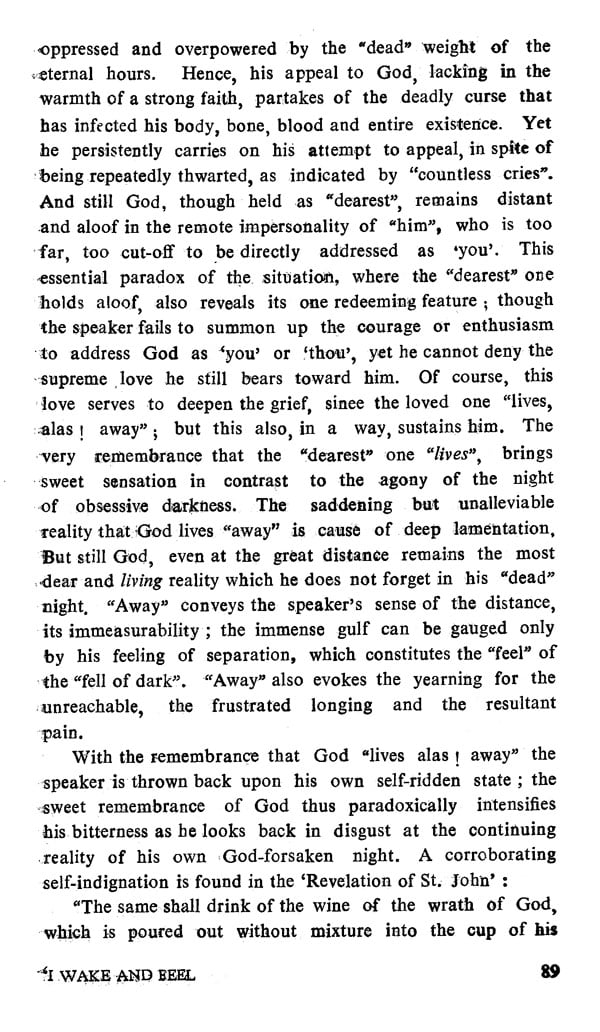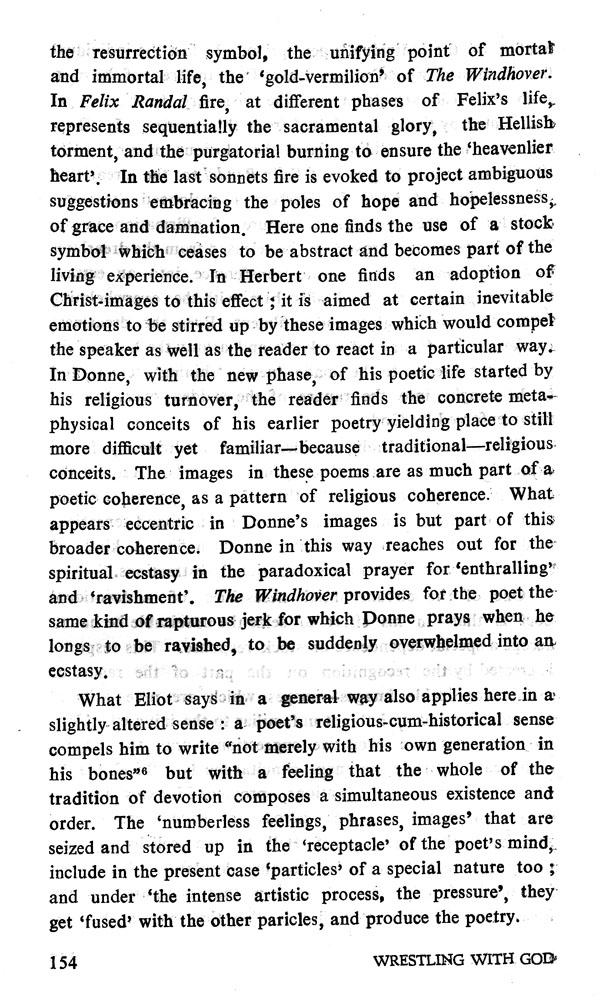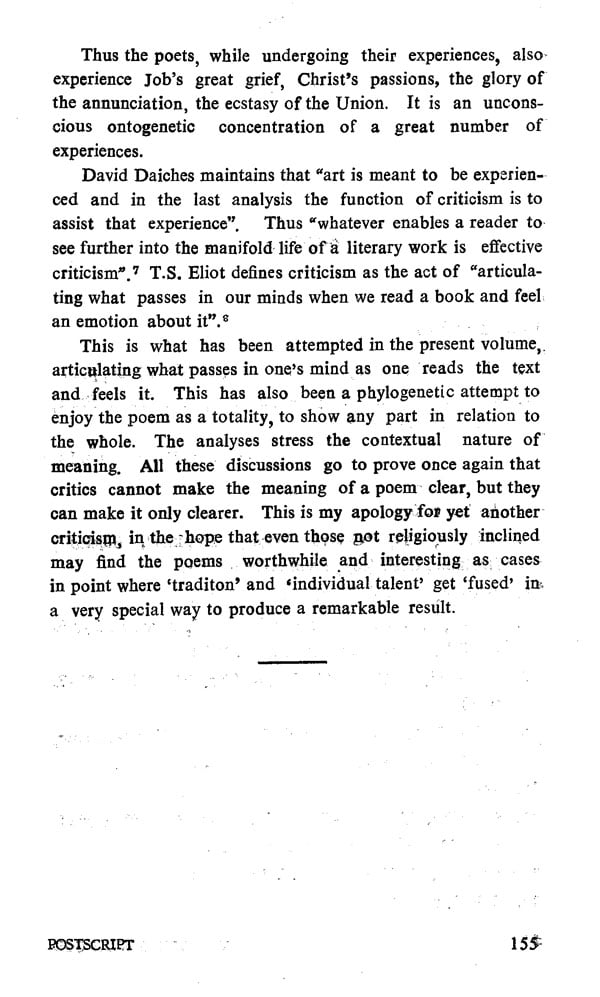
Wrestling with God : Studies in English Devotional Poetry (An Old and Rare Book)
Book Specification
| Item Code: | NAZ650 |
| Author: | Rama Kundu |
| Publisher: | The University of Burdwan |
| Language: | English |
| Edition: | 1996 |
| Pages: | 170 |
| Cover: | PAPERBACK |
| Other Details | 9.00 X 6.00 inch |
| Weight | 160 gm |
Book Description
Dr. Kundu’s book has grown out of a decade of teaching devotional poetry at the post-graduate level. Enjoying poetry is certainly easier than analyzing it. One can describe the formal aspects of a poem on several levels, but one does not respond to these separate levels separately. A poem is a composite whole in which the relationships between its components are more vital than the distinctions. The language of poetry is perhaps the most sophisticated and is more ‘highly structured’ than one suspects. That completeness and revealingness should be the ideals of literary criticism has been widely acknowledged. But the meaning of a poem is more than the sum of its cognitive and formal meanings, and some of the causes of this meaning are inaccessible to analysis. In teaching, the teacher cannot hope to impart to students this extra dimension of meaning ; but the teacher can explain the significant relationships and their close organization to extract value out of technique, and finally he or she can utilize these analyzed fragments as elements in a synthesis.
Dr. Kundu has attempted to do what R. King has done in The Bow and The Lyre. Her explications are free from abstractions and jargons that often vitiate literary criticism. She has carefully analyzed all the significant elements of each of the five poems, but the reader has not been allowed to drift into semantic space , the analyzed elements cohere in a meaningful unit. These essays started as lectures delivered to post-graduate students at Burdwan University. Spoken words are ephemeral, and her decision to print them is welcome. She has not altered these lectures greatly in the printed version, and has retained something of vitality of the spoken word,
Studies in English Devotional Poetry may be regarded as an extended exercise in practical criticism. It will assist the readers—-advanced students and teachers-—not only to- wards a fuller appreciation of the poems discussed, but of the nature of the poetic process itself.
"Why for all of us, out of all that we have heard, seen,. felt, in a life-time, do certain images recur, charged with emotion, rather than others? The song of one bird, the leap. of one fish, at a particular place and time, the scent of one flower such memories may have symbolic value, but of what we cannot tell, for they come to represent the depths of feelings into which we cannot peer",
An unmistakable Eliot touch, describing footfalls echoing. down memory lane, calling up unfathomable recollections, each, again, evoking its own countless clusters of emotional, imaginative, intuitive associations, Now, if the process is. So obscure, so inward with any individual, how much more remote it must be with the withdrawn devotee whose experiences are essentially exclusive and special! What are these echoing footfalls, these remembered images in the mind of a devotional poet ? Indeed, in order to derive the greatest pleasure from a devotional poem, a special framework of references is needed, along with a special way of probing,—a responsive and sensitive exploration into the experiences. which are of a particular category in the sense of being devotional, and at the same time also extremely specific in the sense of being personal and hence unique.
Religion as a subject of poetry—as an emotional, intuitive, or mystical experience seeking expression through the poetic mode, poses a fresh problem of communication, In spite of Freud’s stigmatization of religion as "the universal obsessional] neurosis", it remains for the majority of readers, a remote experience rarely shared, and understood faintly if at all. What Eliot points out, in a different context though, is illuminating: "Hell, though a state, is a state, which can only be thought of, and perhaps only experienced, by the iprojection. of sensory images ; and the resurrection of the body lhas perhaps a deeper meaning than we understand".1 The devotional poet has to wrestle hard for an adequate concrete equivalent to an abstract vision and an obscure experience not normally shared by his reader. The reader cannot expect the kind of delight that attends "what oft was thought fbut never so well expressed" type recognition, Whether it "is hell or heaven, state of depression or state of ecstasy, -agonized alienation or joyous communion, it is a remote state, pointing to an even remoter vision ; hence, the greater is ‘the difficulty of expression. It does not and cannot come that easy as a spontaneous overflow of powerful feelings. Rather, an intermediary stage becomes unavoidable, a stage by which the poet makes his conscious effort at crossing the bar stretching between the earthly and the ethereal. The signs of stiffening and strain in Donne’s ‘holy’ songs and sonnets are remarkable in comparison to the ease and fluency of the earlier love poems, despite their characteristically metaphysical nuances. Helen Gardner explains the ‘difficulty’ ‘of Four Quartets as "inherent in the subject", since Eliot is treating a subject of extreme complexity which is constantly eluding formulation in words, She quotes Eliot’s own phrasing to describe this situation where the poet is "occupied with frontiers of consciousness beyond which words fail, though meanings still exist".2 This is precisely the situation that the devotional poet generally encounters. Thus the very nature of his subject compels the devotional poet to resort to ambiguity as a device, and the reader has to accept dt on its own terms if he wants to enjoy the poetry.
' Ofcourse Empson would have said, "all good poetry" was "supposed to be ambiguous".? But, for the devotional ‘poet, ambiguity is more than a way of expression; it is a poetic need, and sometimes a compulsion. It is, therefore, ‘not unnatural, that devotional poets of even exceptional calibre should generally go misunderstood, or less than understood. T.S. Eliot is a rare phenomenon, and even in his :case, critics turning from The waste land to Four Quartets, often turn apologetic as they encounter so many "signs of the difficulty of Mr. Eliot’s enterprise", Helen Gardner’s is a typical defence: "He is writing of religious experience... But he is doing this in an age which has no universally or even widely held conscious formulation of 'belief".4 What Gardner leaves unmentioned is that this ‘writing of religious experience has been a difficult task even ‘in other ages, Generally speaking, difficulty or obscurity has indeed been part of the predicament of devotional poets through the ages, as they have tried to translate a remote -experience, to express the inexpressible, the ‘billion times told lovelier, more dangerous’ vision in poetry, In pursuing this impossible goal of attaining the unattainable, these poets have found ambiguity indispensable and, as a result, have missed an easy and immidiate communicatien. It is to be -distinguished from the conscious cultivation of obscurity, ambiguity and paradox which has been, since the days of ‘the modernists, a running trend in secular English poetry ‘too. These poets, struck by a new bewildering vision of life, have been desperately in search of an adequate language. But the element of obscurity that has characterized devotional ‘poetry down. the ages has not been intentional or deliberate ; it has marked the poets’ automatic response to the demand of their subject.
Book's Contents and Sample Pages
